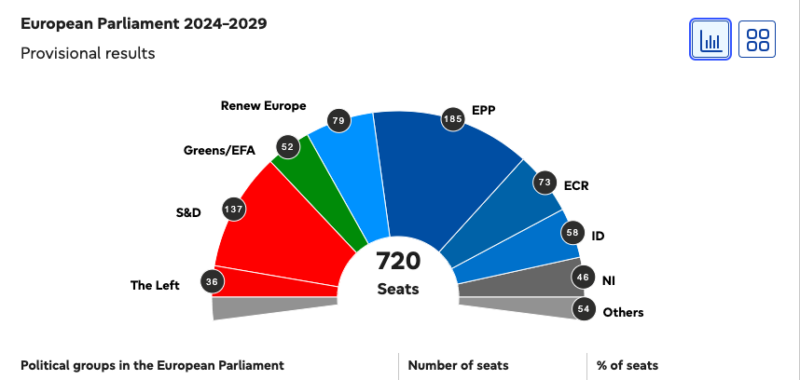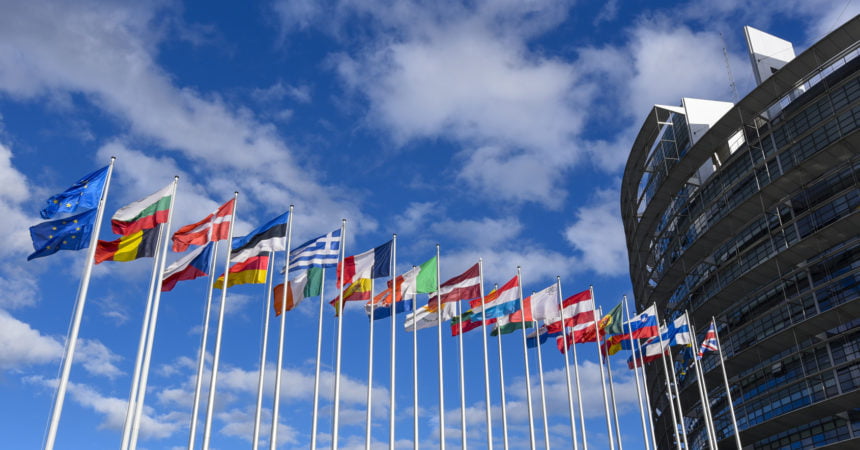The projections of the 2024 European Parliament elections suggest that populist and far-right parties across the continent will make significant gains at the expense of centrist and mainstream groups.
According to the latest projections based on provisional results from 26 EU countries, published by the European Parliament, the right-wing Identity and Democracy (ID) group is set to become the third largest group, securing around 58 seats – an increase of 9 seats from the outgoing Parliament. This surge seems to have been fuelled by strong performances from parties like France’s National Rally and Italy’s League.
The European Conservatives and Reformists (ECR) group is also projected to increase its presence to 73 seats, up four from 2019. On the other hand, the left-wing Greens/EFA group looks set to lose around 19 seats, slipping to 52 MEPs. The centrist Renew Europe group is set to shrink by a staggering 22 seats to 80 MEPs.
While the centre-right European People’s Party (EPP) is forecast to remain the largest group with 185 seats, they, too, have lost some ground in key member states like Germany and Italy. The Socialists & Democrats (S&D), however, are projected to have 139 seats, just two more than in 2019.
Significantly, the number of non-attached and other parties has swelled to 98 seats, up 36 from the outgoing Parliament, making coalition-building and policymaking even more challenging in the new legislature. This complex landscape could potentially hinder the implementation of the bloc’s key policies and initiatives.

2024 European Parliament provisional results. Source: European Parliament
Far-right parties are gaining more influence in several EU countries, whether through election victories, like Geert Wilders’ Freedom Party (PVV) in the Dutch general election last November or by influencing the agenda from the opposition, as seen with the National Rally’s support for France’s immigration bill in December. In 2023, the far right significantly impacted European politics.
At national levels, Malta’s governing party was not the only one to suffer significant losses in a European Parliament election.
Hungary’s ruling Fidesz party is also on track to receive its worst-ever result after early results showed a new challenger took nearly 30 per cent of the vote Sunday. Péter Magyar—a former ruling party insider turned opponent—and his Tisza party scored 29.7 per cent, with 99 per cent of ballots counted.
Hungarian Prime Minister Viktor Orbán’s Fidesz and its smaller allies scored 44.6 per cent, significantly lower than polls had predicted.
According to Politico, Magyar galvanised voters by railing against corruption and Orbán’s regime after entering the race earlier this year. He has vowed to take back the billions in EU funds destined for Hungary, which Brussels has frozen over rule-of-law concerns.
Meanwhile, in France, the far-right National Rally is projected to win the European election with 31.5 per cent of the vote—more than twice that of President Emmanuel Macron’s party. The result pushed Macron to call a snap election on Sunday evening.
The European Parliament’s numbers can also shift once newcomers or parties currently politically unattached in the European Parliament negotiate group affiliation.
Parties currently categorised as non-attached include Viktor Orbán’s Fidesz, estimated to have secured 10 seats and the embattled AfD of Germany, which despite a recent raft of scandals involving probes into foreign influence and neo-Nazi ties, came in second in Germany with 16 seats in the European Parliament.
Many of these smaller parties belong to the far right. A reshuffle could boost the numbers of the two far-right groupings within the parliament, Identity and Democracy (ID) and the European Conservatives and Reformists (ECR).
Talks on party affiliations are expected to kick off on Monday.












